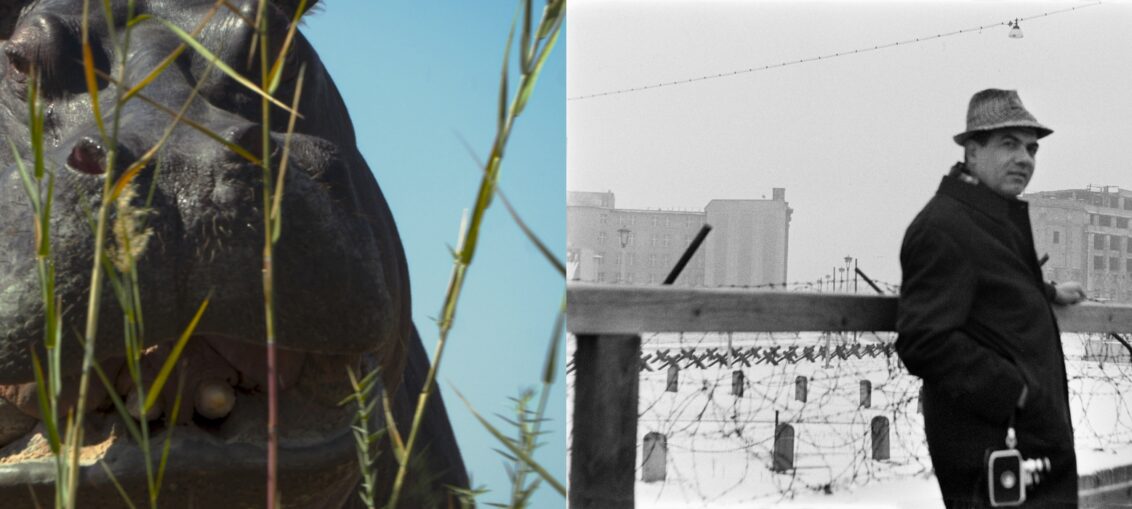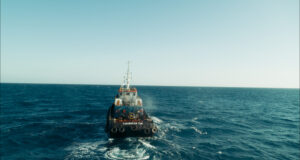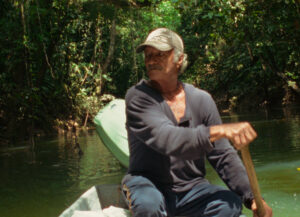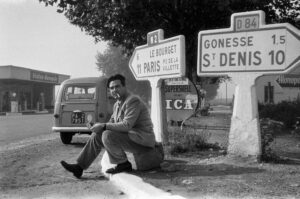
 Costanza Quatriglio opens the door of her father's house to the viewer, showing a reporter from times gone by
Costanza Quatriglio opens the door of her father's house to the viewer, showing a reporter from times gone by
(from Berlin Luigi Noera with the kind collaboration of Maria Vittoria Battaglia and Vittorio De Agrò of the editorial staff Ground floor– The photos are published courtesy of the #BERLINALE)
In Competition #Pepe is an environmentalist film that reminds us of the love for our Mother Earth
#Pepe di Nelson Carlos De Los Santos Arias – Dominican Republic / Namibia / Germany / France 2024 | WP presented in #Competition
 #Pepe is a hippopotamus who was captured and relocated to Latin America. A film about animals and for animals, but also on the slave trade from Africa to the New World. Africa and Latin America, lands of stories like films, are indispensable to the entire world!
#Pepe is a hippopotamus who was captured and relocated to Latin America. A film about animals and for animals, but also on the slave trade from Africa to the New World. Africa and Latin America, lands of stories like films, are indispensable to the entire world!
The incipit makes us listen to the conversation of the African forest guards against poaching, then we move on to the famous cartoon of the hippopotamus Pablo and finally to the death of Pablo Escobar. So far everything is clear about what awaits us.
But let's go in order, everything begins in South Africa in the Rio Kawanga where a family of hippos frolics on the placid waters of the river. This bucolic vision is suddenly interrupted by the deafening noise of the helicopters carrying some crates containing the hippos that are about to be transferred to the Rio Maddalena in Brazil by sea.
In Africa there is environmental tourism and so the director shows us one of the many minibuses that transport tourists in search of wild animals such as hippos. There are many true or false legends about these enormous animals that seem calm with their enormous size, but which in the water they can reach 50 km!
 The film uses two formats for shooting: i 4/5 in filming in Latin America and 16/9 for African filming.
The film uses two formats for shooting: i 4/5 in filming in Latin America and 16/9 for African filming.
The hippos, children of the generations who moved to Latin America are nowadays monitored with cameras that capture night visions of their movements.
The narrative voice of this docu fiction is the guttural voice of the hippopotamus with his impressions of his surroundings.
 Rio Maddalena where the new hippo settlement is located is called Naples, but the current carries them away from the place where they were illegally transferred from South Africa. The comparison between hippos and Pablo Escobar returns with suggestive images of the two rivers.
Rio Maddalena where the new hippo settlement is located is called Naples, but the current carries them away from the place where they were illegally transferred from South Africa. The comparison between hippos and Pablo Escobar returns with suggestive images of the two rivers.
In the second part the farmer Candeloro bursts onto the scene with the story of the encounter with the hippopotamus to his wife Bethany. Candeloro takes his wife Betania to the river to meet the "monster". #Pedro was carried by the current as we were saying, but Betania doesn't believe her husband Candeloro, kicking him out of the house. Not even the river manager believes what happened as told by Candeloro and his friend about the "monster" sighted.
story of the encounter with the hippopotamus to his wife Bethany. Candeloro takes his wife Betania to the river to meet the "monster". #Pedro was carried by the current as we were saying, but Betania doesn't believe her husband Candeloro, kicking him out of the house. Not even the river manager believes what happened as told by Candeloro and his friend about the "monster" sighted.
The film ends on a full moon night with #Pepe exhausted. It is the relationship between man and the environment and the animal kingdom where man is the predator. A film where the protagonist #Pedro is the moral winner.
 It is then difficult to accept that in the section #Encounters such a marginal story is presented. We refer to #MattAndMara di Kazik Radwanski | con Deragh Campbell, Matt Johnson, Mounir Al Shami, Emma Healey, Avery Nayman – Canada 2024 | WP
It is then difficult to accept that in the section #Encounters such a marginal story is presented. We refer to #MattAndMara di Kazik Radwanski | con Deragh Campbell, Matt Johnson, Mounir Al Shami, Emma Healey, Avery Nayman – Canada 2024 | WP
Mara is a high school teacher and an old "friend" of his at school where he was assigned to give lessons.
A film already seen that is based on youthful memories that rekindle a loving feeling in Mara.
Some say that it is a genre where actors can freely improvise on a non-existent plot. It is a benevolent judgment because we see the protagonist confused by the difference between the two lovers. Matt is charming and accomplished, while her husband is a penniless artist and among other things of African origins.
So Mara begins this double life with both of them. She accompanies her husband Matt to his sick father, and soon after we see her jogging with her old flame.
He even manages to take a short trip with his enterprising colleague where the dialogue takes over the writing of the film.
 Finally the exhausted spectator witnesses Mara's change of heart and understands that her place is next to her partner Suaez and their little son.
Finally the exhausted spectator witnesses Mara's change of heart and understands that her place is next to her partner Suaez and their little son.
From the credits we realize that Matt is played by Matt Johnson, a well-known author in a decidedly narcissistic film.
#IlCassettoSegreto Constance Quatriglio – Italy / Switzerland 2024 | WP | DOC which was presented in the section #Forum, third Italian film at #Berlinale.
 The documentary director takes a look at an intimate diary of her father, a journalist for the Giornale di Sicilia, Palermo paper newspaper.
The documentary director takes a look at an intimate diary of her father, a journalist for the Giornale di Sicilia, Palermo paper newspaper.
With amateur shots of Costanza we discover a meticulous person (the father) in cataloging all the trips taken with vintage photos. In short, a blast from the past thanks to the father, an excellent journalist and photographer in the intimate story of the father by his daughter.
But also recordings of unique interviews with Primo Levi after the Belice earthquake of 1968.
Opening his father's vast library and archive now, an entire life dedicated to culture and its diffusion emerges.
Let's discover the graffiti of Palazzo Steri (very well known among the people of Palermo) carried out by those condemned by the Inquisition Court thanks also to the partnership with the other Sicilian Leonardo Sciascia.
The journalist's love for writing in the accumulation of an incredible quantity of books (ed: circa 60.000!) in the space of an apartment. We are in Viale delle Magnolie, adjacent to the Matteotti district, where the Journalists' House is built.
At this point, a brief nostalgic digression on what this neighborhood nestled in the Palermo of the economic boom represented for my generation in which the split between the middle class and the "lower class" occurred. It's exciting to see the Palermo of the economic boom but also of the urban upheaval again. A story where the ashes of her father were preserved under a magnolia which Costanza now decides to exhume together with the immense treasure of the secret drawer: typewriters (also the legendary Olivetti letter 22) and the many cameras owned and used by his father.
The ending is heart-pounding with Costanza as a character, but in reality the documentary that seemed to have exhausted itself regains strength because there are still many secrets to be revealed!
Among which stands out the interview with the Sicilian poet Ignazio Buttitta who on the threshold of eighty years delivers his spiritual testament to his journalist friend.
Adele too, Costanza's mother, first female prosecutor, it has a notable place in the archive of his father Giuseppe. There is also room for the island of Favignana (ed: Egadi islands) where her mother Adele owned her father's house. But also a touch of humor on the astonished faces of the porters responsible for transporting this immense treasure to the National Library of Palermo who have to walk up the last floor in the absence of an elevator!
Now that the Archive has been taken over, everything is done.
Sicilianness pervades the entire story with a way of doing things that no longer exists. The narration is supported by the editing and the sound that also moved me because of my Sicilian origins.
There is also room for the memory of the terrible earthquake that occurred in 1968 hit Western Sicily destroying Gibellina. The controversial "monster" work of art was created on the ruins of the town. The father rushed to document the tragedy of 1968 found love letters in those places that the director offers us as a narrative voice. The documentary lasts just over two hours, but he continually amazes us with the countless anecdotes of #IlCassettoSegreto.
luigi Noera
